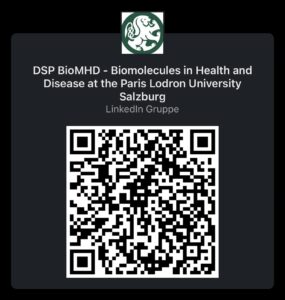 DOCTORATE SCHOOL PLUS – BIOMOLECULES IN HEALTH AND DISEASE
DOCTORATE SCHOOL PLUS – BIOMOLECULES IN HEALTH AND DISEASE
The DSP BioMHD (Biomolecules in Health and Disease) offers an international and interdisciplinary doctoral program in biomedical sciences to highly qualified and motivated doctoral students at the University of Salzburg. The PIs of the DSP BioMHD belong to the department “Biosciences and Medical Biology”, “Center for Tumor Biology and Immunology” (CTBI), “Cancer Cluster Salzburg” (CCS), and/or are PLUS-habilitated researchers at cooperating institutes, such as the Salzburg State Hospitals (SALK).
The expertise of the Principal Investigators (PIs) and PhD students of the DSP BioMHD ranges from advanced organoid cell culture and in vivo animal models, molecular and cellular immunology, structural biology, tumor biology, epigenetics, bioinformatics, and infection biology. Projects in the DSP BioMHD focus on biomolecules, such as cytokines, proteases, signaling molecules, oncogenes, etc. that play a key role in the maintenance of human health and whose deregulation is involved in the induction and progression of human diseases, which also perfectly align with the interests of CTBI and CCS. The projects carried out in these research areas utilize highly multidisciplinary approaches and state-of-the-art technologies (organoid cultures, spatial transcriptomics, confocal laser scanning and STED microscopy, FACS sorting, bisulfite sequencing, etc.).
The DSP BioMHD program is taught entirely in English and provides a comprehensive scientific education. All PhD students regularly report their project progress at the mandatory weekly seminar or the biannual symposia. The scientific work is complemented by participation in advanced laboratory courses and soft skills training.
The students integrated into the DSP BioMHD benefit from the joint training, which also serves international networking. The DSP BioMHD thus sees itself as a multidisciplinary platform within the biosciences for a lively exchange of innovative methods and novel ideas.
PhD positions are advertised internationally, followed by a standardized selection process to ensure an objective recruitment process of PhD students. The procedure for admission to the DSP is based on a presentation, which is evaluated in writing by the faculty. In addition to scientific excellence, the principles of gender mainstreaming are also implemented in the selection process.

For more news and events, follow us on LinkedIn!





